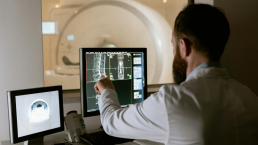
Insights from MDPI Top 5 Picks: April
In April, the top 5 most-read MDPI articles cover a wide range of topics. One study looks at the potential uses of AI technology, such as ChatGPT, in various aspects of healthcare. Another considers vitamin D supplementation in the treatment and prevention of depression and suicide. Read more about these articles and what their authors have to say below.
Micro- and Nanoplastics Breach the Blood–Brain Barrier (BBB): Biomolecular Corona’s Role Revealed
Polymeric materials are used in many of the products around us, from clothing to pesticides. Their widespread use has led to the pollution of our environment and thus micro- and nanoplastic contamination in humans, primarily through our diet.
This study looks into the effect of ingesting these products. The authors use mice as a model and assess whether these products can pass through the blood-brain barrier.
Exploring the Conformational Equilibrium of Mefenamic Acid Released from Silica Aerogels via NMR Analysis
“Our research provides insight into the means of drug delivery. This is especially important for drug compounds with low solubility and low bioavailability. In our work, we have shown that using silica aerogel as a carrier of a drug compound stabilizes its amorphous phase state, significantly increasing solubility. Moreover, conformers of the drug compound in the aerogel matrix were found, which sheds light on the interaction of the drug compound with the target. In the future, we will investigate its release in environments that mimic the biological fluids of the human body. We believe our research provides a valuable contribution to the field.”
- Quote from author Ilya Khodov
ChatGPT Utility in Healthcare Education, Research, and Practice: Systematic Review on the Promising Perspectives and Valid Concerns
“AI technology, such as ChatGPT, will inevitably be used in healthcare education, research, and practice, making it crucial to establish appropriate guidelines and regulations for its safe and responsible use with input from all stakeholders involved. While ChatGPT could enhance innovation, equity, and diversity in research, there are ethical and legal concerns regarding its potential misuse, and a science-driven debate is essential to address this issue. Although healthcare professionals appear to be optimistic about the potential of ChatGPT in clinical decision making and workflow optimization, the impact of the real-world implementation of this AI-based tool must be evaluated to prevent the possible negative consequences. Research is needed to address the potential limitations of ChatGPT in healthcare education, research, and practice and ensure that it is used to complement human decision making, not to replace it.”
- Quote from author Malik Sallam
Vitamin D in Depression: A Potential Bioactive Agent to Reduce Suicide and Suicide Attempt Risk
Depression is affected by many factors. Research has shown that one such factor could be vitamin D deficiency, with some studies showing supplementation to have promising effects on this mood disorder.
This review article highlights the potential pathogenic role of vitamin D deficiency in depression. And, it goes on to look at supplementation as a method to combat this.
The Role of Psychotherapy in the Care of Patients with Myalgic Encephalomyelitis/Chronic Fatigue Syndrome
“Although there is an overwhelming body of evidence on ME/CFS as presenting as a serious physical illness, there is still no recognized therapy for this condition. Because of this, there is controversy as to whether psychosomatic factors play a role and whether psychotherapy can be helpful. However, studies have shown that psychotherapy does not bring about improvement and that certain measures can even be harmful. We present a non-curative psychotherapeutic approach that focuses instead on the management of the cardinal symptom of ME/CFS that poses a particularly difficult challenge for sufferers: post-exertional malaise (PEM). The focus of this approach is learning “pacing” as a method of controlling symptoms and avoiding further deterioration. Patients can thus regain a sense of control and self-confidence, and they can achieve improvement in terms of achieving what is possible within the limitations imposed by the disease.”
- Quote from author Tilman Grande
If you want to find out more about any of the studies mentioned in this article, you can read them for free on the MDPI website.










